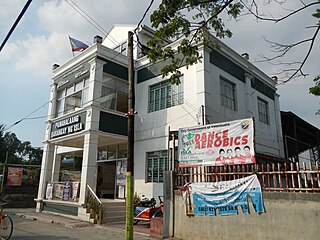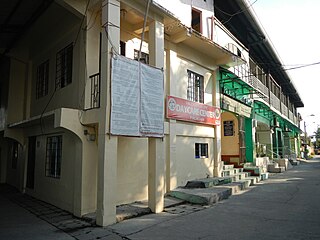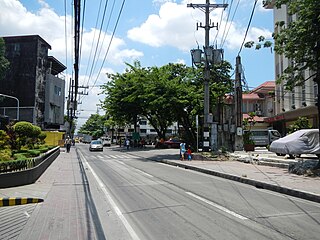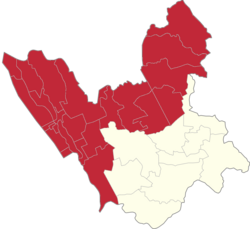
Valenzuela, officially the City of Valenzuela, is a highly urbanized city in the National Capital Region of the Philippines. According to the 2020 census, it has a population of 714,978 people.

Vigan, officially the City of Vigan, is a 4th class component city and capital of the province of Ilocos Sur, Philippines. According to the 2020 census, it has a population of 53,935 people.

Pío Valenzuela y Alejandrino was a Filipino physician and revolutionary leader. At the age of 23, he joined the society of Katipunan, a movement which sought the independence of the Philippines from Spanish colonial rule and started the Philippine Revolution. Together with Andrés Bonifacio and Emilio Jacinto, they formed the secret chamber of the society called Camara Reina. He took charge of the publication of Ang Kalayaan, Katipunan's first and only official publication. He was the one who tried to convince the exiled José Rizal to join the revolutionary movement.
Parian or Parián may refer to:

Dalandanan is one of the highly developed barangays in Valenzuela, Metro Manila, Philippines. It was named after the impressive line of dalandan trees that used to distinguish the area.

Balangkas is one of the barangays of Valenzuela, Metro Manila, Philippines. Balangkas, translated to English means framework.

Museo Valenzuela is a museum in Valenzuela in Metro Manila, Philippines. It is the city's historical and cultural landmark, named after Pío Valenzuela in 1963. Museo Valenzuela features collections of artifacts depicting the city's past and continuing development. It is also a venue for historical, cultural, and artistic presentations as well as seminars and symposia on national and local issues.

Isla is one of the constituent barangays in the city of Valenzuela, Metro Manila, Philippines.

Bisig is one of the constituent barangays in the city of Valenzuela, Metro Manila, Philippines. The name "Bisig" came from an organization in the area several decades ago. Formerly named Buli.

Arkong Bato is one of the constituent barangays in the city of Valenzuela, Metro Manila, Philippines.

Karuhatan is one of the constituent barangays in the city of Valenzuela, Metro Manila, Philippines.

Viente Reales is one of the constituent barangays in the city of Valenzuela, Metro Manila in the Philippines. The barangay is home to industrial factories of wire, fishball, packaging and rubber products.

Palasan is one of the constituent barangays in the city of Valenzuela, Metro Manila, Philippines.

Tagalag, also known as Taga-Ilog, is an urban barangay in Valenzuela, Metro Manila,Philippines. It is one of Valenzuela's northernmost barangays bordering Meycauayan in Bulacan and is famous for fish products such as tilapia and bangus, as well as desserts such as halaya and garbanzos. It was declared as a city eco-tourism zone in 2016.

Malanday is a settlement and one of the constituent barangays in the city of Valenzuela, Metro Manila, Philippines. It is located in the northern section of the city bordering Meycauayan in the province of Bulacan.

Polo or Pulo is a barangay and former municipality within the city of Valenzuela, Philippines. It is located in the northern part of Valenzuela, and was an independent municipality from 1623 to 1963.

Nicanor Garcia Street, historically known as Calle Reposo or Reposo Street, is a street that runs several hundred meters north of Gil Puyat Avenue in Bel-Air Village, Makati, Metro Manila, Philippines. It crosses Jupiter Street/Metropolitan Avenue and Kalayaan Avenue, ending at J.P. Rizal Avenue along the barangay boundaries of Poblacion and Valenzuela. It has a short extension into Rizal Village, named Antipolo Street. The street is notable for its art galleries, interior design showrooms, and fine dining restaurants.

Maysan Road is one of the main east–west thoroughfares of Valenzuela, Philippines. It is a narrow street with only one lane in each direction, making it one of the most congested streets in northern Metro Manila. It runs for approximately 4.5 kilometers (2.8 mi) from MacArthur Highway in barangay Malinta, past the North Luzon Expressway intersection, into North Caloocan. The road connects the central Valenzuela barangays of Malinta, Maysan, Paso de Blas, and Bagbaguin. It was the main access road for vehicles going to Valenzuela and the Manila North Harbor from the North Luzon Expressway before the construction of NLEX Segment 9, which parallels it to the south.

Valenzuela's 1st congressional district is one of the two congressional districts of the Philippines in the city of Valenzuela. It has been represented in the House of Representatives of the Philippines since 2001. The district was created following Valenzuela's conversion into a highly urbanised city through Republic Act No. 8526 on February 14, 1998. It consists of 24 barangays in the northern part of the city, namely Arkong Bato, Balangkas, Bignay, Bisig, Canumay East, Canumay West, Coloong, Dalandanan, Isla, Lawang Bato, Lingunan, Mabolo, Malanday, Malinta, Palasan, Pariancillo Villa, Pasolo, Poblacion, Polo, Punturin, Rincon, Tagalag, Veinte Reales, and Wawang Pulo. It is currently vacant for the 19th Congress since the resignation of its most recent representative, Rex Gatchalian, upon assuming the position of Secretary of Social Welfare and Development in 2023.






















